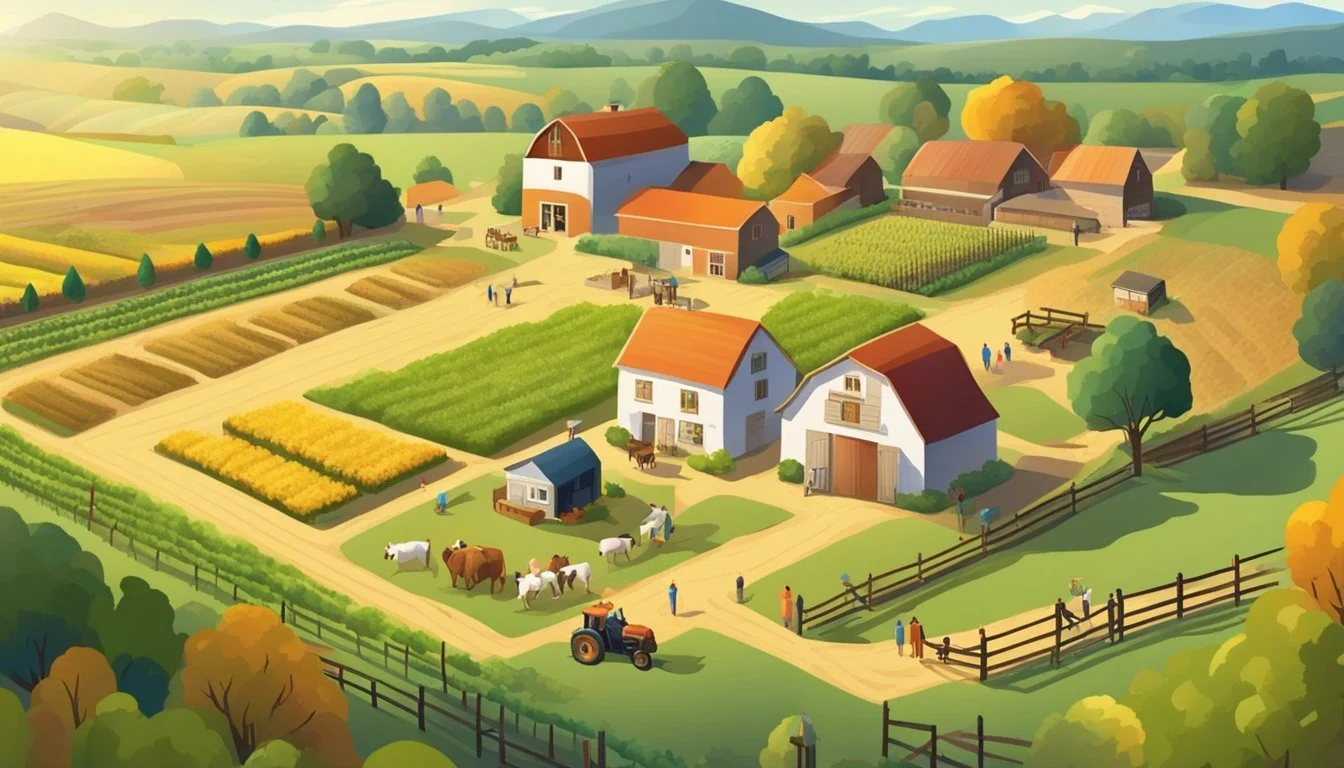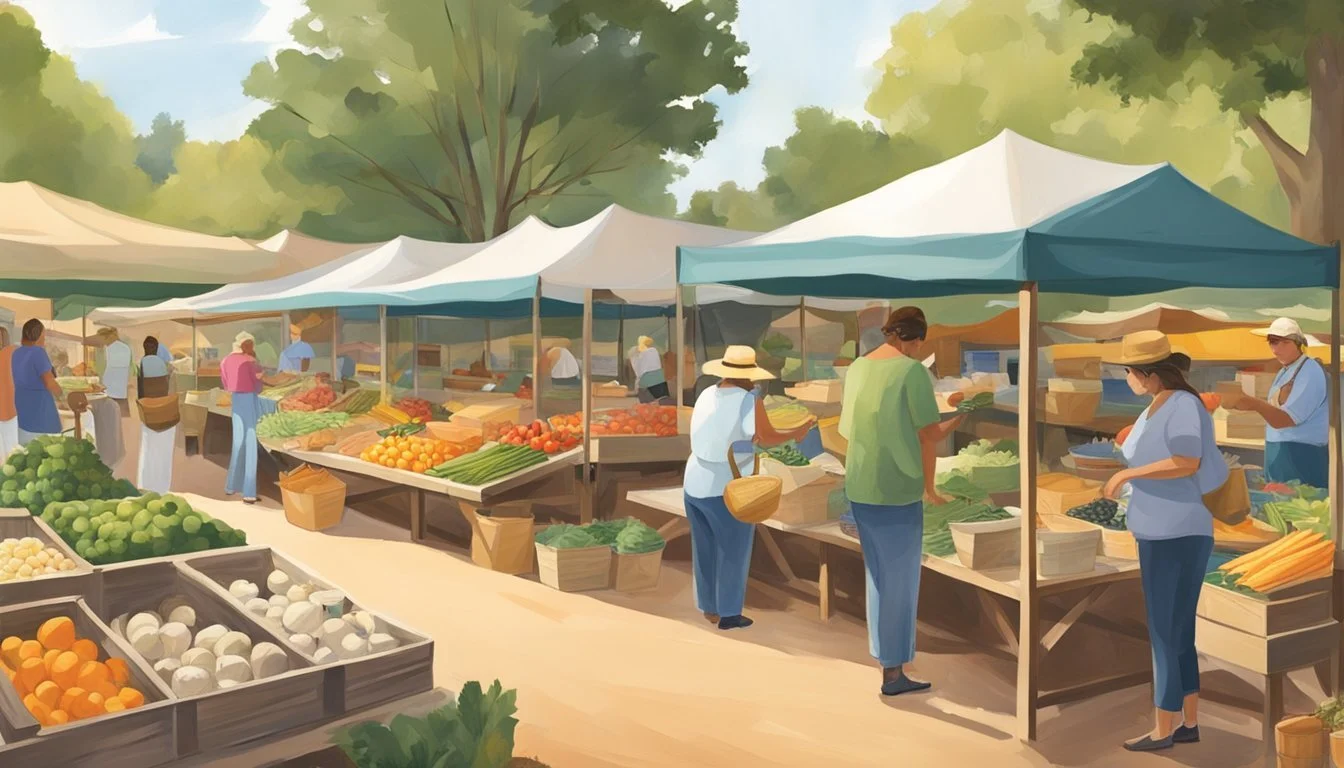Agritourism in South Carolina
A Guide to Rural Adventures
Agritourism in South Carolina offers a unique opportunity for visitors to immerse themselves in the local culture while supporting the state's thriving agriculture sector. South Carolina's landscape is dotted with farms that welcome the public to experience farm life, participate in educational tours, and enjoy the fruits of the local farmers' labor. This intersection of tourism and agriculture provides an economic boost to farmers and an educational benefit to visitors, who gain a deeper understanding of where their food comes from and how it is produced.
South Carolina Department of Agriculture recognizes the importance of connecting people with agriculture, facilitating programs that encourage agritourism. One such initiative is the South Carolina Agritourism Passport Program, designed to guide tourists as they explore various farms across the state. Travelers can collect stamps in their passports as they visit different farms, partaking in diverse agricultural experiences from picking fresh produce to sampling locally-crafted wines.
This form of tourism not only promotes a sense of community between consumers and producers but also helps preserve South Carolina's rural heritage. Through agritourism, visitors can engage with aspects of farming and horticulture, experiencing everything from traditional agricultural methods to modern agribusiness operations. The state's varied climate and fertile soil make it an ideal location for a wide range of agritourism activities available year-round, contributing to the growth and evolution of this sector within South Carolina.
Understanding Agritourism
In South Carolina, agritourism combines the state's rich agricultural heritage with a growing public interest in rural experiences, linking past and present through various engaging activities.
History of Agritourism in South Carolina
Agritourism has deep roots in South Carolina. From its early agrarian society to the present day, the state has continuously evolved to meet the increasing public interest in agricultural practices and rural life. Historical records show that the state's farm activities have long included public participation, with farm visits and direct sales to visitors becoming more structured over time. This transition from informal interactions to organized agritourism has helped preserve South Carolina's rural legacy while contributing to the local economy.
Definition and Scope
Agritourism in South Carolina refers to the intersection of agriculture and tourism whereby visitors engage with farm-based activities. Its scope is diverse, encompassing a wide range of activities such as pick-your-own berry operations, farm tours, and agricultural festivals. Through these experiences, agritourism serves a dual purpose: it educates the public on the importance of agricultural industries and provides an economic boost to rural communities by diversifying farmers' incomes.
Key Agritourism Attractions in South Carolina
South Carolina boasts a variety of agritourism attractions that emphasize hands-on experiences and authentic farm life. From breathtaking vineyards to interactive farm activities, visitors can indulge in the state's agricultural heritage.
Famous Farms and Orchards
Chattooga Belle Farm: This farm exemplifies South Carolina's agritourism with its vast vineyard, U-pick orchards featuring apples and other fruits, and offers a picturesque landscape in the Upstate for outdoor weddings and events.
SCDA Agritourism Farms: With over 463 registered agritourism farms, visitors have the opportunity to experience farm life through a variety of farms that might include corn mazes, hayrides, and farm-to-table treats.
Unique Tours and Activities
Agritourism Passport Program: Travelers can explore the agricultural offerings of South Carolina by participating in the Passport Program, collecting stamps from each of the specially selected farms, which offer unique experiences such as hiking, disc golf, and educational tours.
Seasonal Events and Activities: Farms frequently host seasonal activities, including elaborate corn mazes in the fall, and farm stores often sell locally produced milk and homemade goodies year-round.
Agritourism Passport Program
The Agritourism Passport Program, an initiative by the South Carolina Department of Agriculture, offers an engaging way to explore and support local agriculture. Participants can collect stamps from various farms to receive rewards.
Participating Farms
The program boasts a network of diverse farms across South Carolina, each providing a unique agricultural experience. These experiences range from crop mazes and u-pick fields to hayrides, wineries, and petting zoos. Visitors can obtain the passport from participating farms, ensuring an opportunity to explore multiple facets of agritourism.
Crop Mazes: Navigating through intricate patterns
U-picks: Harvesting one's own produce
Hayrides: Enjoying scenic farm tours
Wineries: Tasting local wines
Petting Zoos: Interacting with farm animals
Rewards and Incentives
Collecting stamps from the participating farms yields tangible perks, such as Certified South Carolina items. These rewards serve as an incentive to visit multiple locations, thus fostering a deeper connection with the state’s agricultural sector.
Stamps Collected: Prizes vary based on the number of stamps
Certified SC Items: Products showcasing South Carolina's quality
By participating, one not only garners a firsthand understanding of farming activities but also supports the local economy and agriculture.
Support and Resources for Agritourism Businesses
Agritourism businesses in South Carolina are supported by a robust set of resources that assist with marketing strategies and provide comprehensive operational handbooks and manuals, fostering successful ventures in this sector.
Marketing Strategies
The South Carolina Department of Agriculture (SCDA) ensures that agritourism ventures have access to effective marketing strategies to reach their target audience. Key strategies include:
Participation in the Certified SC program: This branding tool helps businesses by promoting locally grown and produced items.
Listing in the Agritourism Farms Directory: Farms can enhance their visibility through this resource offered by the SCDA, which features various agritourism operations.
Educational seminars and workshops: Hands-on opportunities to learn about current marketing trends relevant to agritourism.
Social media guidance: Specific recommendations on how to leverage social media platforms to engage with customers and drive sales.
Operational Handbooks and Manuals
To assist in business planning, farm safety, and legal considerations, a variety of handbooks and manuals are available, including:
Agritourism 101 Manual: A publication by the South Carolina Department of Agriculture offers detailed guidance on establishing and running an agritourism business.
South Carolina Agritourism Association Support: The association provides members with resources pertinent to business planning and operations.
Legal Consideration Resources: Information provided on legal liabilities and the necessary steps to mitigate risks.
Farm Safety Procedures: Detailed best practices to ensure the safety of both guests and staff on the premises.
Local Artisans and Products
South Carolina's agritourism combines the rich tradition of local craftsmanship with an abundance of fresh agricultural produce. Visitors can expect a tapestry of creative works and a diverse selection of farm-fresh goods.
Crafts and Artwork
Artisans across the state present a vibrant collection of handmade items, often showcased within the rustic settings of local farms. Visitors can watch as these creators produce their works, which include:
Baskets: Traditional and contemporary designs
Homemade Wreaths: Seasonal and ornamental
Pottery: Functional and decorative items with local clay
Textiles: Woven fabrics and quilts with intricate patterns
These artisans not only sell their creations but also offer insight into their artistic processes, making each piece a story of South Carolina's cultural heritage.
Local Food and Produce
The agritourism trail is also dotted with a variety of fresh food products straight from the farm. Consumers have access to:
Fruits: Seasonal selection from berries to orchard delights
Vegetables: A colorful array of field-grown produce
Artisan Breads and Cheeses: Crafted using traditional methods
Specialty Meats and Seafood: Locally sourced and sustainable options
In addition to purchasing these items, visitors can learn about the cultivation of fruits and vegetables, and even participate in the harvesting process at some farms, gaining an appreciation for the journey from soil to table.
Accommodation and Amenities
Agritourism in South Carolina offers a variety of accommodation options tailored to diverse traveler needs, whether one is looking for the homeliness of RV parks or the indulgence of farm-fresh treats.
RV Parks and Lodging
A key component of agritourism accommodations is the inclusion of RV parks. These venues often provide amenities such as electric hookups, Wi-Fi, and restroom facilities, with some offering TV access for a cozy evening after exploring the farm. Lodging on farms is not just about convenience but also about immersion in rural life, with accommodations ranging from rustic to modern to ensure a comfortable stay.
RV Amenities
Electrical hookups
Wi-Fi access
Restroom facilities
TV access (select locations)
Lodging Types
Bed and Breakfasts
Farmhouses
Cabins
Food and Treats on the Farm
Visitors to South Carolina's agritourism farms can savor an authentic farm experience, with many locations offering the chance to taste fresh milk straight from the dairy cows or enjoy treats made with ingredients grown on the farm. Farm-to-table dining events are a significant draw, serving dishes that champion local produce and traditional Southern recipes.
Culinary Experiences
Dairy tasting sessions featuring fresh milk
Homemade treats using farm-grown ingredients
Farm-to-table meals highlighting local cuisine
Food experiences often extend beyond simple tastings and include interactive elements like picking one's own produce in cities like York, blending culinary pleasure with agricultural education.
Event Planning and Hosting
Event planning and hosting on South Carolina farms offer unique and memorable settings for various social occasions. The state's agritourism push encompasses a range of activities that can be tailored to suit personal celebrations or corporate gatherings, providing guests with an authentic rural experience.
Farm Weddings
Venue Selection:
Availability of outdoor spaces for ceremonies and receptions.
The picturesque backdrop of South Carolina’s countryside.
Essentials:
Outdoor Facilities: Provision of tents, chairs, and tables.
Catering: Options range from farm-to-table experiences to food trucks.
Activities:
Hayride: Offers leisurely tours of the farm for guests.
Corporate and Private Events
Capacity and Amenities:
Facilities suited to group sizes and event needs.
Audiovisual equipment for presentations and entertainment.
Team Building:
Customized activities that promote teamwork and engagement, such as group hayrides.
Hands-on farming experiences.
Services:
On-site coordination and planning assistance.
Flexible catering policies, including local and seasonal produce options.
Agritourism and Education
Agritourism in South Carolina offers enriching educational experiences where visitors can learn about farming and agricultural practices. These interactions cultivate a deeper understanding of the agricultural industry through hands-on experiences.
Educational Tours
Educational tours provide visitors to South Carolina agritourism farms with the opportunity to engage in learning activities directly related to agriculture. Visitors often encounter:
Hayrides: Offering a scenic view of the crops and insight into farm operations.
Guided Walks: Educators explain the various stages of plant growth, harvest methods, and the importance of sustainable practices.
Demonstrations: From milking cows to shearing sheep, guests observe daily farm tasks up close.
Workshops: Participants may learn skills such as canning, cheese-making, and more.
These tours blend knowledge-sharing with enjoyment, ensuring guests leave with both a fun memory and increased agricultural awareness.
Agriculture Awareness
The goal of agritourism is to raise awareness about the importance of agriculture in daily life. Farms create interactive experiences to explain:
Crop cycles: Visitors understand seasonal farming activities.
Farming Challenges: Exposure to the complexities of farming, including weather dependence and pest management.
Local Produce Benefits: Emphasizing the advantages of buying local and supporting the local economy and environment.
By providing these insights into agriculture, South Carolina's agritourism farms foster a connection between consumers and the source of their food, which can lead to more informed choices about what they eat and support.
Regulatory Framework
The regulatory framework for agritourism in South Carolina is established to safeguard participants and ensure that agritourism operations comply with state laws. Operators must navigate both safety regulations and zoning laws to maintain legal standing.
Safety Regulations
Safety is paramount in agritourism, and South Carolina has enacted regulations to protect visitors and workers on farms. Operators must:
Conduct regular safety inspections to identify and mitigate any potential hazards.
Implement safety protocols which may include emergency response plans, proper signage, and safety barriers.
Adhere to safety standards as stipulated by state guidelines for agritourism operations.
Zoning and Legal Compliance
Zoning and legal compliance are critical aspects of running an agritourism business in South Carolina. Operators should be aware of:
Zoning ordinances that dictate land use and may require special permits for agritourism activities.
Liability laws, such as those detailed in South Carolina Code Ann. § 46-53-10 to 46-53-50, outlining definitions and stipulations for agritourism activities.
Legal considerations involve creating liability waivers and understanding the implications of South Carolina's Agritourism and Recreational Use statutes to mitigate risks.










